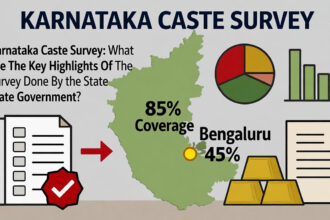
Bihar Govt Jobs: 35 percent Reservation for Women Sparks Political Row
In a major political and administrative move, Bihar Chief Minister Nitish Kumar has announced 35 percent reservation for women in Bihar government jobs. The decision, declared just ahead of the 2025 state elections, has triggered a wave of mixed reactions. While supporters call it a bold step for gender equality, critics argue it is yet another attempt at vote bank consolidation in the name of social justice.
- Bihar Govt Jobs: 35 percent Reservation for Women Sparks Political Row
- Announcement
- Historical Context of Reservation in Bihar
- What the Government Says
- Criticism and Public Backlash
- Political Reactions
- Legal Framework & Constitutionality
- Merit vs. Quota Debate
- Ground Reality and Implementation Challenges
- Electoral Impact
- National Implications
- Public Sentiment on Social Media
- Data Snapshot
- Conclusion
As the state gears up for an intense electoral battle, the move has reignited the national debate over reservation, meritocracy, and identity politics.
Announcement
On July 7, 2025, Nitish Kumar announced that 35 percent of all Bihar government jobs would now be reserved for women, spanning across all cadres and categories. The move comes on the heels of similar reservations in police and education departments implemented during his earlier terms.
This time, however, the policy extends to all state government departments, making it one of the most sweeping gender based reservation moves in Indian history.
Historical Context of Reservation in Bihar
Bihar has long been a political laboratory for social engineering through caste based and gender based reservations. In the 1990s, the Mandal Commission recommendations transformed Indian politics, and Bihar was at its epicenter. Nitish Kumar himself has championed various affirmative actions over the years from reservation in Panchayats for women to reservations for backward classes and EBCs.
However, this fresh move has stirred a different kind of debate, as it comes at a politically sensitive time.
What the Government Says
Nitish Kumar has defended the decision, claiming it is essential for building an inclusive and equitable administrative workforce. “Women are equally capable, and they must be represented in government structures. This is not appeasement but empowerment,” he said during the press briefing.
He also referenced global examples of affirmative action to support the move and positioned Bihar as a progressive state.
Criticism and Public Backlash
Despite the government’s claims, the announcement of 35 percent reservation for women in Bihar government jobs has come under intense scrutiny:
- Timing before elections has raised suspicions of vote bank politics.
- No mention of merit or general category youth, especially males, has sparked outrage on social media.
- Many youth groups and civil society voices argue that this is an act of political appeasement, not policy progress.
Many youth groups and civil society voices argue that this is an act of political appeasement, not policy progress.
One user on X (formerly Twitter) wrote:”How long will we tolerate this quota raj in the name of social justice? What about those who actually work hard and still don’t get a chance?”
Political Reactions
The opposition in Bihar has been quick to respond.
Tejashwi Yadav from the RJD accused Nitish of hypocrisy:”The same Nitish Kumar who ignored women’s safety for years is now suddenly their messiah? This is nothing but a last ditch electoral gimmick.”
BJP leaders have also pointed out the overlapping of caste and gender based reservations, warning that such policies create unsustainable layers of affirmative action and marginalize meritorious candidates.
Legal Framework & Constitutionality
From a legal standpoint, the Constitution of India permits reasonable reservation for socially and educationally backward classes, including women, under Article 15(3) and Article 16.
However, legal experts caution that expanding quotas without addressing structural limitations can lead to reverse discrimination, especially when merit based hiring opportunities shrink for open category candidates.
Also, with the 50% cap on reservations set by the Supreme Court (Indra Sawhney case), the combined effect of caste, class, and gender-based quotas might invite legal challenges.
Merit vs. Quota Debate
The core issue at the heart of this policy is the merit vs. reservation dilemma.
Supporters of meritocracy argue that too much dependence on reservation dilutes administrative efficiency. When over 85% of jobs are reserved whether by caste, gender, or economic background there’s little scope left for open competition.
In contrast, proponents of reservation argue that historical inequality and patriarchal barriers must be corrected through such measures.
But critics note:
Will 35% reservation for women in Bihar government jobs truly benefit rural and underprivileged women?
Or will it become a tool for urban elite and political networks to corner benefits?
Ground Reality and Implementation Challenges
Implementing 35 percent reservation for women in Bihar government jobs isn’t just a policy announcement it requires structural preparation:
- Recruitment agencies like BPSC and Bihar SSC need to modify their frameworks.
- Department wise job segregation and balancing with existing quotas will be complex.
- The quality of selection and training support for newly recruited women will be critical.
Electoral Impact
The electoral significance of the move cannot be overlooked. Bihar elections are slated for late 2025, and Nitish Kumar’s JD(U) faces stiff competition from both the BJP and RJD led Mahagathbandhan.
By announcing 35 percent reservation for women in Bihar government jobs, Nitish may aim to:
- Galvanize female voters, especially first time job aspirants
- Appeal to families of women candidates
- Rebrand himself as the true champion of women’s rights
But whether this will translate into votes or backlash remains to be seen.
National Implications
Bihar has often set the trend for nationwide policy replication. From prohibition to reservation to caste census, other states have followed its lead. If this 35 percent women job quota goes unchallenged and yields electoral benefits, we could see similar moves in:
- Uttar Pradesh
- West Bengal
- Chhattisgarh
- Jharkhand
The policy could also spark fresh discussions at the central level, especially ahead of the 2029 General Elections.
Public Sentiment on Social Media
The hashtag #QuotaRaj and #BiharJobs started trending within hours of the announcement. Here are some sample reactions:
- “Why study hard if everything is reservation?”
- “Is Nitish Kumar scared of losing power?”
- “I support women’s rights but not like this merit should matter too.”
- “What about deserving poor men from general category?”
Data Snapshot
- Bihar’s female literacy rate: 63.82% (2021 Census)
- Government job vacancies in 2024-25: Approx. 1.8 lakh
- Female representation in govt jobs before this move: 12–14%
- Expected increase post policy: Up to 35–38%
Conclusion
The announcement of 35% reservation for women in Bihar government jobs is a powerful political and social signal.
In the long run, India must strike a balance between equality and meritocracy, between social justice and competence. Overusing the reservation tool for political gains may risk alienating large segments of the youth who feel left behind despite working hard.
Stay Connected with The News Drill for more updates.
Got a story on reservation, merit, or employment challenges in India? Email us at editor@thenewsdrill.com or visit our contributor page.
For press inquiries:contact@thenewsdrill.com















